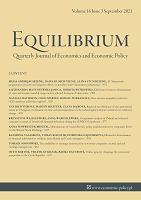Executive compensation and the financial performance of Polish listed companies from the corporate governance perspective
Executive compensation and the financial performance of Polish listed companies from the corporate governance perspective
Author(s): Artur Sajnóg, Anna Rogozińska-PawełczykSubject(s): Financial Markets, Fiscal Politics / Budgeting, Accounting - Business Administration
Published by: Instytut Badań Gospodarczych
Keywords: executive compensation; corporate governance; financial performance; comprehensive income; Polish listed companies;
Summary/Abstract: Research background: The level of compensation earned by CEOs and the relationship between executive pay and companies? performance is one of the most widely studied issues in the corporate governance literature. Studies conducted in the last several decades have provided evidence that CEO pay should be aligned with accounting financial measures. Purpose of the article: The main purpose of this paper is to determine the relationship between executive compensation and organizational financial performance. In particular, the effect of net income and comprehensive income as the accounting measures of financial performance on executive compensation is compared. Methods: The research comprised listed companies on the Warsaw Stock Exchange (WSE). The role and effect of accounting financial measures on executive compensation are analyzed based on three regression models. The period of analysis spanned ten years, from 2009 to 2018. Findings & value added: There are three conclusions that can be drawn from the study. Firstly, executive compensation in the analyzed companies largely depends on the accounting measures of financial performance, based on net income and comprehensive income (excluding ROE). Secondly, its level is significantly and positively influenced by the company?s size, Tobin?s Q ratio, debt ratio, and dividend rate. Thirdly, comprehensive income has a stronger effect on executive compensation than net income. Our findings add some potentially noteworthy dimensions to the economic literature on corporate governance, which is especially important to apply in the CEE region and other emerging economies. The Anglo-American assumption of corporate governance and executive compensation policy might not be suitable for the realities in much of the world.
Journal: Equilibrium. Quarterly Journal of Economics and Economic Policy
- Issue Year: 17/2022
- Issue No: 2
- Page Range: 459-480
- Page Count: 22
- Language: English

